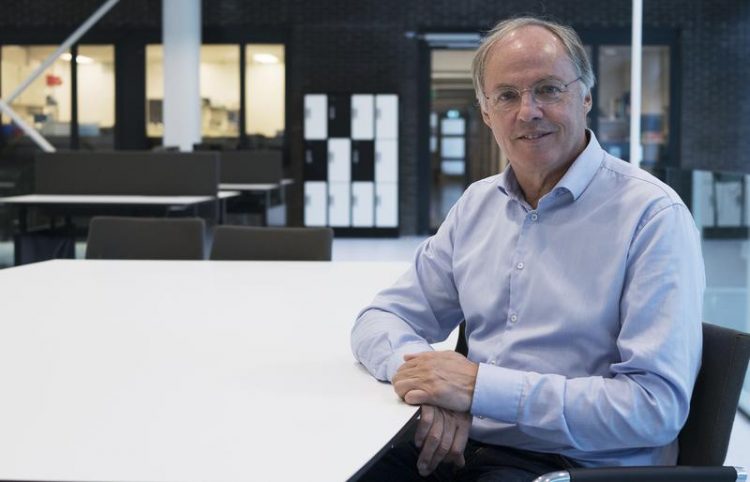Replacement organs from a Petri dish: The Körber European Science Prize 2016 goes to Hans Clevers

The Körber Foundation is awarding the Körber Prize to Hans Clevers for his ground-breaking findings on stem cells Koerber Foundation/Friedrun Reinhold
Hans Clevers is to receive the Körber European Science Prize 2016, which is endowed with 750,000 euros. The Dutch biologist and physician has developed a new standard procedure for the unlimited reproduction of adult stem cells, enabling the growth of rudimentary organs in miniature format, known as organoids.
Drugs can now be tested in lifelike conditions in the Petri dish, and damaged organs can be repaired and possibly replaced. The Körber Foundation is awarding the Körber Prize to Hans Clevers for his ground-breaking findings and their further development up to clinical application. Clevers intends to use the prize money to conduct research on gene therapy.
Hans Clevers, 59, studied biology and medicine and obtained his doctorate in immunology in 1985 at the University of Utrecht. As a postdoc he conducted research for three years at the Dana-Farber Cancer Institute in Boston. From 1991 to 2002 he was Professor of Immunology at the University of Utrecht, and since 2002 has been a Professor of Molecular Genetics. From 2012 to 2015 he was also President of the Dutch Academy of Sciences. Since 2015 Clevers has been Head of the Research Department at the Princess Máxima Center in Utrecht, a newly established paediatric cancer hospital.
The prize winner conducts research primarily on adult stem cells in digestive organs, in particular in the small intestine. In contrast to embryonic stem cells that are present only in early embryos, adult stem cells are present in the body after birth and can repair defects throughout a person's life. They also regularly renew the inner tissue lining (epithelium) of the small intestine.
Clevers is particularly interested in the signals that cause the stem cells to divide. Using a receptor (Lgr5) discovered by him which is only present in stem cells, he succeeded in isolating these cells from retrieved intestinal tissue. The Lgr5 receptor is also found in the stem cells of many other organs, such as the liver, stomach, pancreas, kidneys and prostate.
In 2009, Clevers, together with his postdoc Toshiro Sato, successfully generated an intestine-organoid from a single intestinal stem cell, which survived for several months in the Petri dish. The team had to assemble a cocktail of several growth factors, including a gel called “Matrigel”, which acts as a support structure to facilitate the development of the three-dimensional organoid. This is regarded as a breakthrough in stem cell research: In the meantime, there are over 200 laboratories worldwide, cultivating organoids, including miniature stomachs and tiny kidneys and livers.
The mini-organs, which can also be cultivated from tumour tissue, are already suitable for testing drugs. “Instead of subjecting a bowel cancer patient to non-specific chemotherapy, we can prescribe a drug that has been particularly effective on his laboratory-tested tumour organoids,” says Hans Clevers.
The prize-winner has already demonstrated in laboratory mice that reimplanted liver organoids can actually take over the function of the liver. This shows their suitability as replacement organs. In 2013 Clevers successfully removed the genetic defect from intestinal stem cells of patients suffering from the hereditary disease cystic fibrosis, using a newly developed genetic engineering process (CRISPR/Cas9). Tests on the organoids generated from the corrected stem cells have shown them to be free of cystic fibrosis. Clevers hopes to be able to cure rare hereditary liver defects in the same way in the future.
The Körber European Science Prize 2016 will be presented to the Dutch research scientist on 7 September in the large festival hall of Hamburg City Hall.
http://www.koerber-prize.org Further information and pictures for download
Media Contact
All latest news from the category: Awards Funding
Newest articles

NASA: Mystery of life’s handedness deepens
The mystery of why life uses molecules with specific orientations has deepened with a NASA-funded discovery that RNA — a key molecule thought to have potentially held the instructions for…

What are the effects of historic lithium mining on water quality?
Study reveals low levels of common contaminants but high levels of other elements in waters associated with an abandoned lithium mine. Lithium ore and mining waste from a historic lithium…

Quantum-inspired design boosts efficiency of heat-to-electricity conversion
Rice engineers take unconventional route to improving thermophotovoltaic systems. Researchers at Rice University have found a new way to improve a key element of thermophotovoltaic (TPV) systems, which convert heat…



